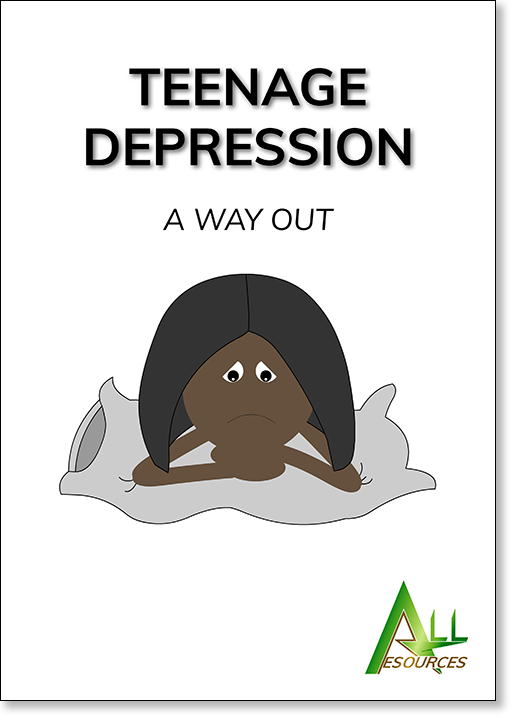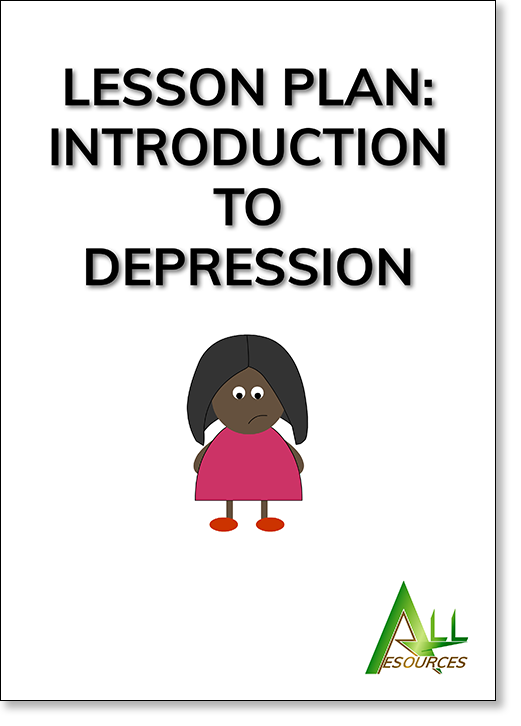Depression
Depression can affect anyone at any time. Sometimes the feelings of sadness and despair can get worse and may leave an individual feeling confused, helpless and anxious. Many are feeling depressed because of the current cost of living crisis.

Teenage Depression — A Way Out
Tackles the issue of depression including causes and signs that parents and teachers can look out for.
- Age range: 12 years and upwards
- Category: Schools
- Last revised: 2022
- Pages: 87
- Illustrated throughout
Hard copy: £35.99 add to basket
Depression Lesson Plans

Introduction to Depression
This lesson plan introduces depression and the way it affects us physically and mentally.
- Age range: 12 years and upwards
- Category: Lesson plan
- First published: 2022
- Pages: 14
- Duration: 55 mins – 1 hour
Hard copy: £10.99 add to basket
What is Depression?
What is depression? Why do some people get depressed? Can you recover from depression?
There are different levels of depression and although many people who are depressed get better without medical intervention, a depressive illness can hit so severely that life no longer has any meaning. In such cases it is important to seek medical attention.
Ordinary periods of sadness come and go, but depression is more serious than simply being ‘out of sorts’. There are no miracle cures for depression, but there are things we can all do to maintain a positive mental health. It is easier to get out of depression if we understand it.
Types of Depression
The different types of depression include:
Endogenous Depression
Endogenous depression occurs for no obvious reason. It is not caused by a traumatic event or a period of extreme stress — it seems to come from ‘within’ a person and may be due to body chemistry. It could also be due to an incident in childhood, a bereavement or another unresolved trauma.
Exogenous Depression (‘Reactive Depression’)
Exogenous depression usually occurs after a traumatic incident or stressful event. It can be caused by the death of a loved one, a serious illness such as cancer, or some other life-changing event.
Bipolar Disorder
Bipolar disorder, formerly known as manic depression, is characterised by extreme mood swings — from high (manic) mood to low (depressed) mood. An individual has periods where they feel happy followed by periods of depression. Someone with bipolar disorder should seek help from their GP.
Seasonal Depression (SAD — ‘Seasonal Affective Disorder’)
This type of depression is linked to the seasons, with the most common type occurring in the dark winter months. As the winter begins, people with SAD start to feel hopeless and despairing. Some people suffer from summer SAD and are adversely affected by the long summer days.
Postnatal Depression (‘Postpartum Depression’/‘Perinatal Depression’)
Postnatal depression occurs after childbirth, although it can also occur during pregnancy. It is caused by hormonal changes during pregnancy and these can trigger chemical changes in the brain. This can lead to mood swings and depression.
Major Depression (‘Major Depressive Disorder’)
People with major depression experience severe feelings of despair and despondency. Nothing gives them any joy and they have no interest in normal daily activities. They lack energy, find it hard to concentrate, have difficulty sleeping and are plagued by feelings of hopelessness and worthlessness. This type of depression usually requires medical intervention.
Depression Symptoms
The most common symptoms of all types of depression include:
- Feeling sad
- Lack of appetite or overeating
- Difficulty sleeping or sleeping too much
- Lack of energy
- Emotional distress
- Inability to concentrate
- Lack of interest in things you used to enjoy
- Social isolation
- Withdrawal from family and friends
- Feeling worthless or hopeless
- Constantly worried or anxious
If feelings of depression worsen, or if an individual starts to think about self-harming or suicide, it is vital that medical help is sought as soon as possible.



